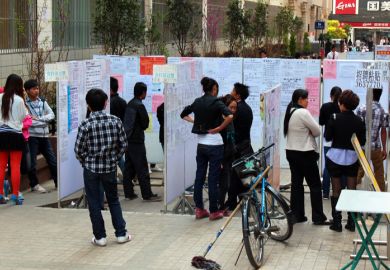As millions of students receive their degrees, Chinese universities have been warned for the second year running against fudging their graduate employment figures – but scholars say most of the sector is making a good-faith effort to improve students’ career outcomes.
This month, China’s Ministry of Education reportedly urged institutions to verify the authenticity of their graduates’ job claims, especially in cases where university leavers are self-employed, freelancers or working overseas.
The call, which echoes last year’s warning, comes amid continued soaring youth unemployment. Just last month, Chinese authorities announced that universities would embark on a “100-day sprint” to boost the graduate employment rate.
The outlook is grim. According to figures recently released by the National Bureau of Statistics of China, the jobless rate of 16- to 24-year-olds in urban areas has risen to 21.3 per cent.
But despite these bleak statistics, academics said Chinese universities have been making genuine gains in developing more robust career services for students – changes that might not lead to a striking turnaround of joblessness in the near term but could help learners in the future.
Yang Rui, professor of higher education at the University of Hong Kong, said Chinese universities were “absolutely” putting more effort into getting their graduates employed, with individual solutions taking “various forms”.
A recent announcement from China’s government contains some examples. Beijing Jiaotong University, for instance, has launched an online employment “training camp” to provide services such as CV reviews and mock interviews for unemployed graduates. Hebei University, meanwhile, is helping graduates “diagnose difficulties and problems in the job-hunting process”.
Overall, the document states, more than 2,600 colleges and universities across the country have visited more than 236,000 companies, and the effort is said to have made a significant contribution to the creation of more than 2.9 million jobs since May.
“Under great pressure, this situation has begun to change, but only slowly,” said Professor Yang.
Futao Huang, a professor of higher education at Hiroshima University, agreed that universities – along with local authorities and the central government – have made “huge efforts”, especially since early this year.
For institutions, a lot is at stake, he said. Poor performance can mean government intervention to shutter certain disciplines. Meanwhile, low graduate employment can hinder efforts to recruit future students.
“Students and families increasingly expect their universities to do more to help with this,” said Professor Huang.
In 2022, the Chinese government set an employment growth goal for 11 million urban jobs, while the number of university and college graduates totalled 10.8 million – nearly equal to the new jobs planned, noted Qiang Zha, interim director for the York Centre for Asian Research, part of York University.
“As such, the employment issue presumptively became a higher education issue, and the universities and colleges have been put on the spot,” said Dr Zha.
“Since the top institutional leaders are now under pressure, you can assume most universities and colleges now take it as their responsibility to help the graduates, though they could only do what they can.”
At the government’s behest, universities have tackled the problem by admitting more students for further studies and creating research assistant positions to offer interim employment, he said.
Another solution has been to axe programmes that are perceived to have poor graduate employment prospects. In April, the Ministry of Education announced that it was culling 925 university programmes deemed superfluous to its goal of becoming a science and technology superpower.
It was the biggest such cut of its type, said Dr Zha, adding that more subjects could soon follow.
“Currently, management and arts programmes are targeted for adjustment and rectification, he said.
Register to continue
Why register?
- Registration is free and only takes a moment
- Once registered, you can read 3 articles a month
- Sign up for our newsletter
Subscribe
Or subscribe for unlimited access to:
- Unlimited access to news, views, insights & reviews
- Digital editions
- Digital access to THE’s university and college rankings analysis
Already registered or a current subscriber?








